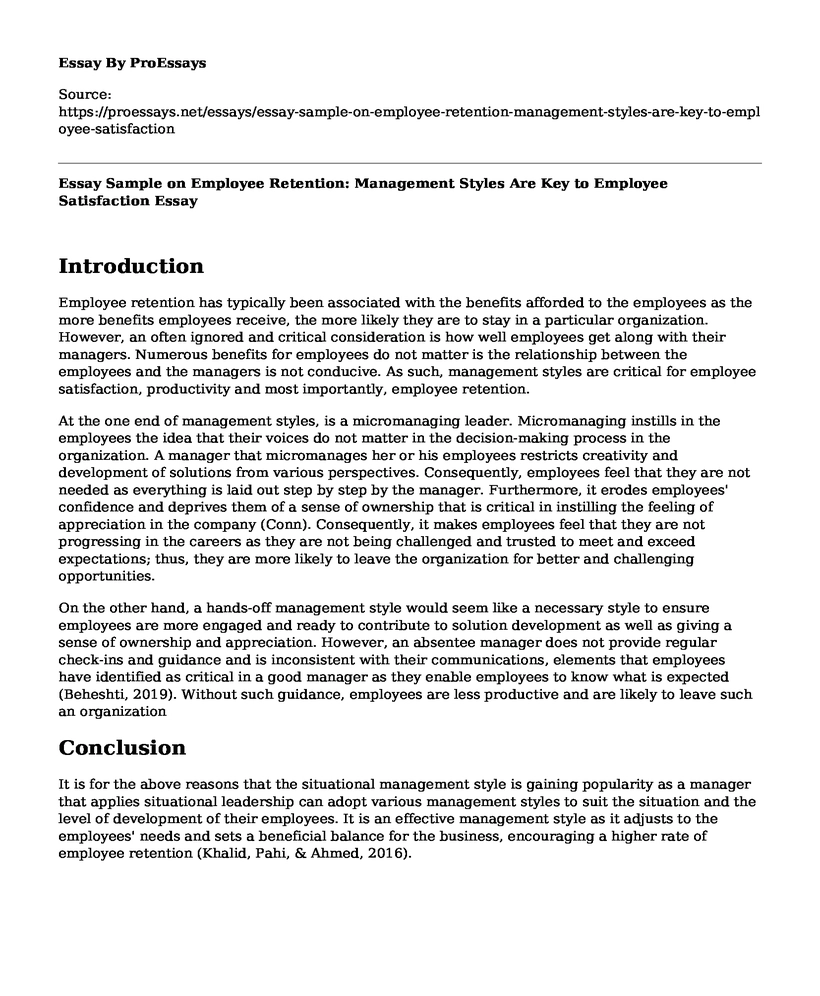Introduction
Employee retention has typically been associated with the benefits afforded to the employees as the more benefits employees receive, the more likely they are to stay in a particular organization. However, an often ignored and critical consideration is how well employees get along with their managers. Numerous benefits for employees do not matter is the relationship between the employees and the managers is not conducive. As such, management styles are critical for employee satisfaction, productivity and most importantly, employee retention.
At the one end of management styles, is a micromanaging leader. Micromanaging instills in the employees the idea that their voices do not matter in the decision-making process in the organization. A manager that micromanages her or his employees restricts creativity and development of solutions from various perspectives. Consequently, employees feel that they are not needed as everything is laid out step by step by the manager. Furthermore, it erodes employees' confidence and deprives them of a sense of ownership that is critical in instilling the feeling of appreciation in the company (Conn). Consequently, it makes employees feel that they are not progressing in the careers as they are not being challenged and trusted to meet and exceed expectations; thus, they are more likely to leave the organization for better and challenging opportunities.
On the other hand, a hands-off management style would seem like a necessary style to ensure employees are more engaged and ready to contribute to solution development as well as giving a sense of ownership and appreciation. However, an absentee manager does not provide regular check-ins and guidance and is inconsistent with their communications, elements that employees have identified as critical in a good manager as they enable employees to know what is expected (Beheshti, 2019). Without such guidance, employees are less productive and are likely to leave such an organization
Conclusion
It is for the above reasons that the situational management style is gaining popularity as a manager that applies situational leadership can adopt various management styles to suit the situation and the level of development of their employees. It is an effective management style as it adjusts to the employees' needs and sets a beneficial balance for the business, encouraging a higher rate of employee retention (Khalid, Pahi, & Ahmed, 2016).
References
Beheshti, N. (2019, June 27). New Millennial Survey Finds A "Generation Disrupted": How Business Leaders Can Respond. Retrieved from Forbes: https://www.forbes.com/sites/nazbeheshti/2019/06/27/new-millennial-survey-finds-a-generation-disrupted-how-business-leaders-can-respond/#2ee0769b48d4
Conn, M. (n.d.). How Different Leadership Styles Impact Employee Retention. Retrieved from Alaant: https://www.alaant.com/blog-news/how-different-leadership-styles-impact-employee-retention
Khalid, N., Pahi, M. H., & Ahmed, U. (2016). Loosing your best talent: Can leadership retain employees? The dilemma of the banking sector of Hyderabad Sindh, Pakistan: A mediation investigation. International Review of Management and Marketing , 608-616.
Cite this page
Essay Sample on Employee Retention: Management Styles Are Key to Employee Satisfaction. (2023, Apr 28). Retrieved from https://proessays.net/essays/essay-sample-on-employee-retention-management-styles-are-key-to-employee-satisfaction
If you are the original author of this essay and no longer wish to have it published on the ProEssays website, please click below to request its removal:
- Essay Example on Conflicts in Business Organizations
- Paper Example on Christian Virtue and Civic Responsibility
- Essay Sample on Proper Leadership Ethics
- Essay Example on UTI in SCI: Risks and Prevention
- Essay Example on Allison Elam's Idea: New MRP System or Costly Catastrophe?
- Essay on Organizational Behavior: Uniting People, Resources and Planning for Optimal Results
- Essay on Strategic Organizational Development: Information Management Key to Knowledge Mgmt Systems







